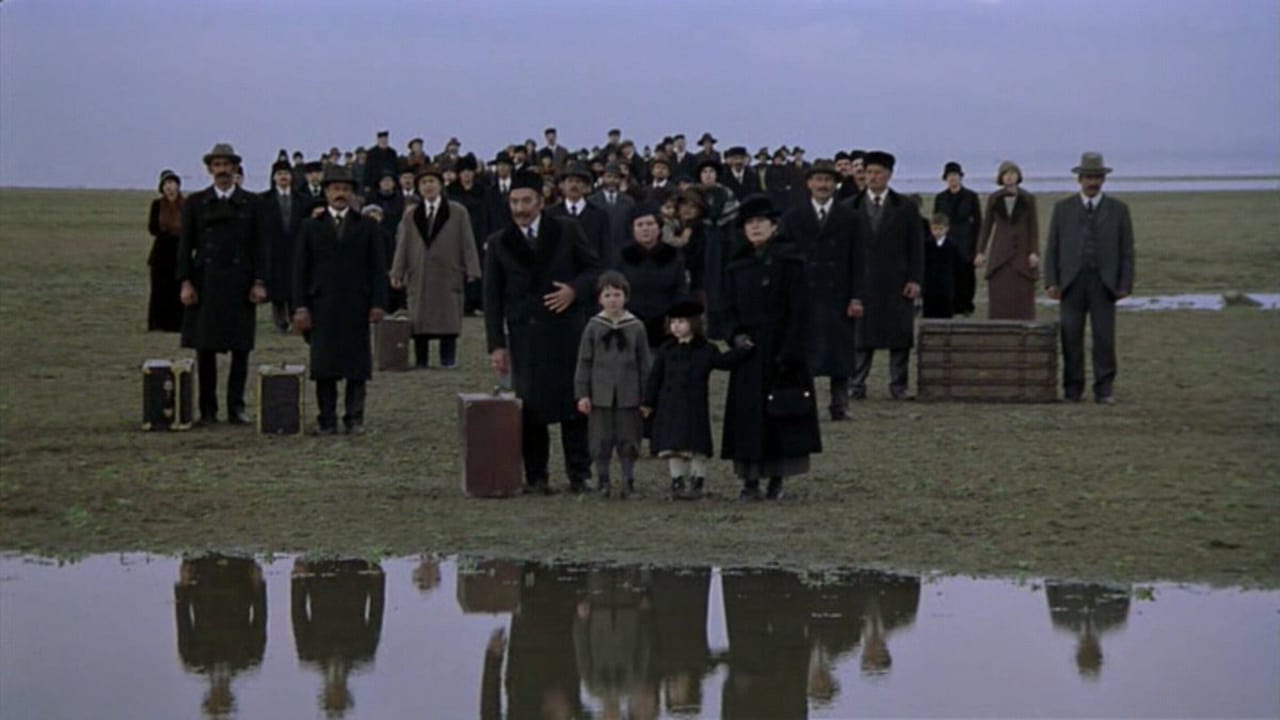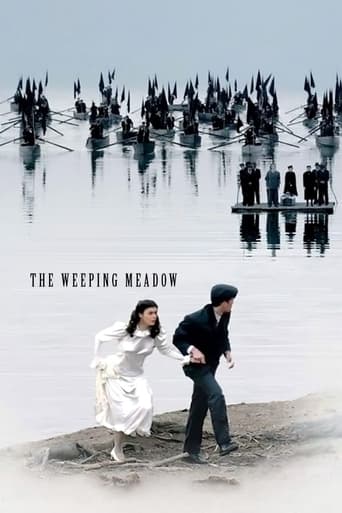

Very very predictable, including the post credit scene !!!
... View MoreThis is a tender, generous movie that likes its characters and presents them as real people, full of flaws and strengths.
... View MoreThis is one of the few movies I've ever seen where the whole audience broke into spontaneous, loud applause a third of the way in.
... View MoreWhile it is a pity that the story wasn't told with more visual finesse, this is trivial compared to our real-world problems. It takes a good movie to put that into perspective.
... View MoreAnytime you sit down to a historical piece, especially a part of a trilogy, you must be prepared for an investment of time. In this case, it is 3 hours more or less, depending on the version.The period that the first part of the Trilogy covers is 1919 -1949. Theodoros Angelopoulos presents 30 years of Greek history beginning with the return of the exiles from Odessa after WWI to the rise of the Colonels.Eleni, who witnesses the history, is played by an unknown, Alexandra Aidini. He does not use her in the second film.She is to marry Spyros (Vassilis Kolovos), but loves his son Alexis (Nikos Poursadinis), She runs off with him. They had two children that were taken and given to a rich woman. They managed to get them back after the village flooded. Alexis heads to America, while Eleni loses the children again after she is imprisoned. The war takes a toll on the family. There is much weeping among the women and those who didn't wear black, did so now.But, the film is really not about the characters. It is about Greece, and the pain she has endured in this century.It is a dark and dreary film with plenty of rain and cloudy skies. It is not meant to be joyful as the period is not joyful, as we watch dreams shattered, and people surviving, but just barely.With music by Eleni Karaindrou and cinematography by Andreas Sinanos, you are not bored by the lack of dialog. In fact, you are left to enjoy and experience the time and the film.Those who enjoy Bergman, Fellini, Kurosawa, and other great masters, will certainly enjoy Theodoros Angelopoulos. I hope he finished this trilogy, as he will be almost 80 when he does.
... View MoreTHE WEEPING MEADOW ('Trilogia I: To Livadi pou dakryzei') is writer/director Theodoros Angelopoulos (with influences from Tonino Guerra plus assistance from Petros Markaris and Giorgio Silvagni) creating a personal vision of the 20th century. The incredibly gifted Greek poet of a filmmaker mirrored the life and death of his own mother whose time on earth spanned a century and elected to capture the 100 years of sadness in a trilogy of films: The Weeping Meadow is Part I and details the years 1919 through 1949. It is a masterwork.The film opens with what will be the trademark look of the movie - vistas of lonely people in a nearly monochromatic color space that uses water, both from rain and the collected results of rain. A group of refugees from Odessa have landed by a river in Thessaloniki where they must attempt to reconstruct their lives. Among them is a family - a wife and husband with their young son and a three-year-old orphan Eleni they have protected. The entire movie seems to be in slow motion, but that is just the studied, unhurried rhythm of Angelopoulos' direction. As time passes we find that Eleni at a very early age has just given birth to twin boys while she has been sent away for the family's appearances: the father is the young son of the family. The story progresses through the World Wars, the civil wars, the influence of Hitler and Mussolini, the natural disasters of floods and disease, the social disparities of class, the rise of unions, the fall of democracy - all mirrored in the family that is trying to make the chaos of living in Greece resemble some sort of order. The young man is a musician and once he and Eleni have reunited with their twin boys, he decides he will go to America, the land of Promise for poverty stricken refugees, to work and make enough money to bring Eleni and the twins to America. But in his absence the progressive civil unrest and poverty the three endure in his absence results in the ultimate dissolution of the family.The story is less important than the moods evoked. The cinematography by Andreas Sinanos is a long gallery of miraculously composed, beautiful images: the cortège on the river, the flapping white sheets behind which we discover musicians, the constant vistas of the ocean and the river, the village and the battlegrounds burn themselves onto our visual fields and into memory. The gorgeous music that accompanies this symphonic work is by Eleni Karaindrou, mixing folksongs with wondrous symphonic moments. The cast is superb: they manage to create very specific people despite the fact that we rarely see them up close. But in the end this visual treasure is the extraordinary work of Theodoros Angelopoulos. If this is Part I of a Trilogy (at almost three hours running time), we can only imagine the power that will follow in the Parts II and III. Experiencing THE WEEPING MEADOW takes patience and a long uninterrupted period of time; the rewards are immeasurably fine. In Greek with English subtitles. Grady Harp
... View MoreI have just finished watching this great movie....fortunately with the English Subtitles. I think its a masterpiece by Theo. Beautiful story, strong characters, captivating scenery, breath taking music and ultimately of cource great production.Its a long movie and the start might be a bit boring but as the story progresses it will hold your attentionI recommend this movie if you are looking for some sensitive piece of art. Though there is quite a lot of tragedy in it but it does give a glimpse of the life of Greek immigrants of that time and the horrors of war.Two Thumbs Up...........
... View MoreHad I known to what I was submitting myself, I would have fled from the theater. The film is dreadful, in the literal sense of the word. Despite striking images, intriguing locales, and a subject matter that might have been fascinating, the film is dead.I was unfamiliar with this period of Greek history, and prepared to experience a great film. The filmmakers's hand is heavy. it is not enough to see a train going by; we must watch it from afar, we must watch it car by car, we must see the smoke, we must see it slow down, and we must see it stop. The director's approach is didactic. Likewise, the characters that he creates never develop, they never change. They are so stereotypic that we wonder, are they meant to be Everyman? Everygirl? Everyoldmusician? Is there some point to this allegory? It is the most pretentious film that I have seen in a long while.
... View More